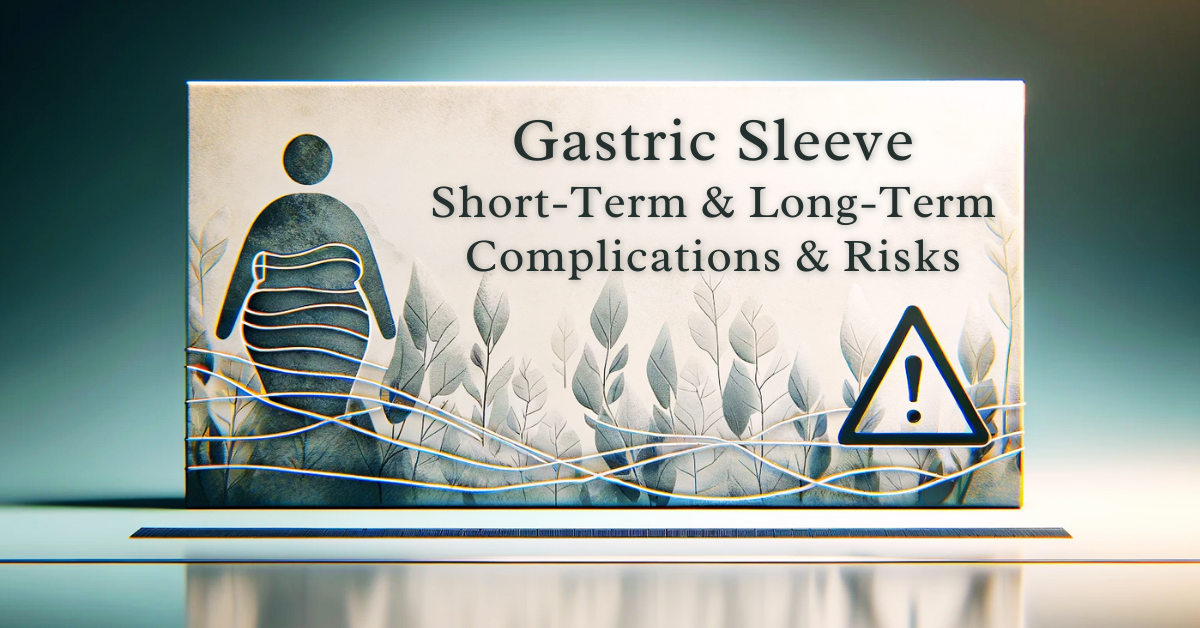Your cart is empty
Looks like you haven't added anything to your cart yet

Gastric Sleeve Surgery Complications Statistics: Short-Term & Long-Term Risks 2024
Gastric Sleeve Surgery Risk
Gastric sleeve surgery, also known as sleeve gastrectomy, is a weight loss procedure that involves the removal of a large portion of the stomach. While it has been proven effective in promoting significant weight loss and improving obesity-related conditions, it is not without risks. These risks can be categorized into short-term and long-term complications.
Short-Term Complications from Gastric Sleeve Surgery
The percentages in the following Complications tables are based off individual and accumulated studies. Click on the risk percentage to view the study that the data was taken from. Remember that an individual who has had gastric sleeve surgery can change the outcomes of their surgery through adhering to all recommendations from their bariatric physician, surgeon, or medical care team.
| Complication | Description | Percentage Risk |
|---|---|---|
| Leakage | Leakage from the staple line is a significant concern, potentially occurring shortly after surgery. | 1-3% |
| Bleeding | Bleeding in the staple line is a common acute complication. | 1-5% |
| Stricture/Stenosis | Narrowing of the stomach, which may require endoscopic dilation for treatment. | 0.6-4% |
| Infection | Infections can occur at keyhole incisions or deep within the abdomen. | 3.2% |
| Blood Clots | Formation of blood clots is a risk associated with surgery. | <1% |
| Dehydration | Dehydration can occur due to reduced fluid intake capacity. (Most Common Short Term Complication) | 3.7% |
| Adverse Reactions to Anesthesia | Some patients may have adverse reactions to the anesthesia used during the procedure. | % Unknown |
See Also:
Long-Term Complications from Gastric Sleeve Surgery
| Complication | Description | Percentage Risk |
|---|---|---|
| Gastroesophageal Reflux (GERD) | Increased prevalence or worsening of GERD postoperatively. | 30% |
| Nutritional Deficiencies | Reduced ability to absorb nutrients can lead to deficiencies. | Varies Immensely |
| Weight Gain | Some patients may experience weight gain or failure to lose weight. | range from 5.7% at two years to 75.6% at six years |
| Dumping Syndrome | Rapid gastric emptying, leading to symptoms like nausea and dizziness. | 25% |
| Low Blood Sugar (Hypoglycemia) | Some patients may experience episodes of low blood sugar. | 22% |
| Malnutrition | Despite weight loss, some patients may experience malnutrition due to reduced nutrient absorption. | |
| Ulcers | Development of ulcers in the stomach or small intestine. | 1% |
| Bowel Obstruction | Obstruction in the gastrointestinal tract, potentially requiring surgical intervention. | <1% |
| Hernias | Hernias can develop at the surgical site. | 5% |
Please note that these complications can vary based on a variety of factors including the patient's overall health, the skill and experience of the surgeon, and the specific techniques used during the procedure.

Nutritional Deficiencies After Gastric Sleeve Surgery
| Nutrient | Percentage of Patients with Deficiency |
|---|---|
| Iron | 25% |
| Folic Acid | 1.7% - 29.7% to 15.3% |
| Magnesium | 20% |
| Phosphorus | 3% |
| Vitamin D | 35% - 76.1% |
| Vitamin B1 | 5.5% - 9.0% |
| Vitamin B6 | 12.0% - 0.2% |
| Ferritin | 21.6% - 32.5% |
| Vitamin B12 | 14.3% - 6.3% |
This table summarizes the range of nutritional deficiencies that can occur after gastric sleeve surgery. The percentages indicate the proportion of patients experiencing each type of deficiency.
Why Complications Are Worth the Risk
Obesity-Related Health Risks
Obesity is a major public health concern and is associated with numerous health risks. Individuals with obesity are at an increased risk for developing conditions such as heart disease, high blood pressure, type 2 diabetes, obstructive sleep apnea, certain types of cancer, and stroke. These conditions not only diminish the quality of life but also increase the risk of premature death. Obesity can also lead to psychological issues such as depression and anxiety, as well as social problems like bullying and stigma.
Benefits of Gastric Sleeve Surgery
Gastric sleeve surgery can lead to significant long-term weight loss, which can improve or resolve many obesity-related conditions. The procedure prompts hormonal changes that assist with weight loss and help alleviate conditions associated with being overweight. For example, it can improve blood sugar levels, which is particularly beneficial for individuals with type 2 diabetes. Additionally, it can lead to better cardiovascular health by reducing levels of bad cholesterol and triglycerides, and increasing good cholesterol.
The surgery may also reduce the risk of obesity-related conditions such as fatty liver disease, GERD, chronic back and joint pain, and sleep apnea. Moreover, losing excess weight makes it easier to be physically active, which further contributes to improved overall health.
Weighing the Risks and Benefits
When considering gastric sleeve surgery, it's essential to weigh the risks of the surgery against the risks of not treating obesity. The risks of surgery are generally low compared to the potential benefits. For instance, surgery for weight loss lowers the risk of death related to many diseases, including heart disease, diabetes, and cancer.

Furthermore, the risk of death due to surgery is very low, about the same as gallbladder surgery, and the benefits of surgery extend beyond weight loss to include improvements in quality of life and the ability to perform daily activities.
Conclusion
In conclusion, while gastric sleeve surgery carries risks of complications, these must be balanced against the substantial health risks associated with obesity. For many individuals with severe obesity, the potential to significantly improve health outcomes and quality of life makes the risks associated with the surgery worth considering. It is a tool that, when combined with lifestyle changes, can offer a path to a healthier and more active life. It's important for individuals to discuss the potential risks and benefits with their healthcare provider to make an informed decision that aligns with their health goals and circumstances.
Writer: Allison Allison is a seasoned nutritionist and writer with over 15 years in health and weight management. She's authored journals on medical weight loss and bariatric medicine, and has specialized in bariatric foods. |
Reviewed By: Dr. K. Huffman Dr. Kevin D. Huffman, D.O., is a board-certified bariatric physician renowned for his expertise in treating obesity. With over 10,000 patients and a reputation as a national leader in bariatric medicine, he has trained hundreds of healthcare providers. Dr. Huffman develops protocols and training materials sought after by medical societies, pharmaceutical companies, patients, and hospitals. |
- Choosing a selection results in a full page refresh.










